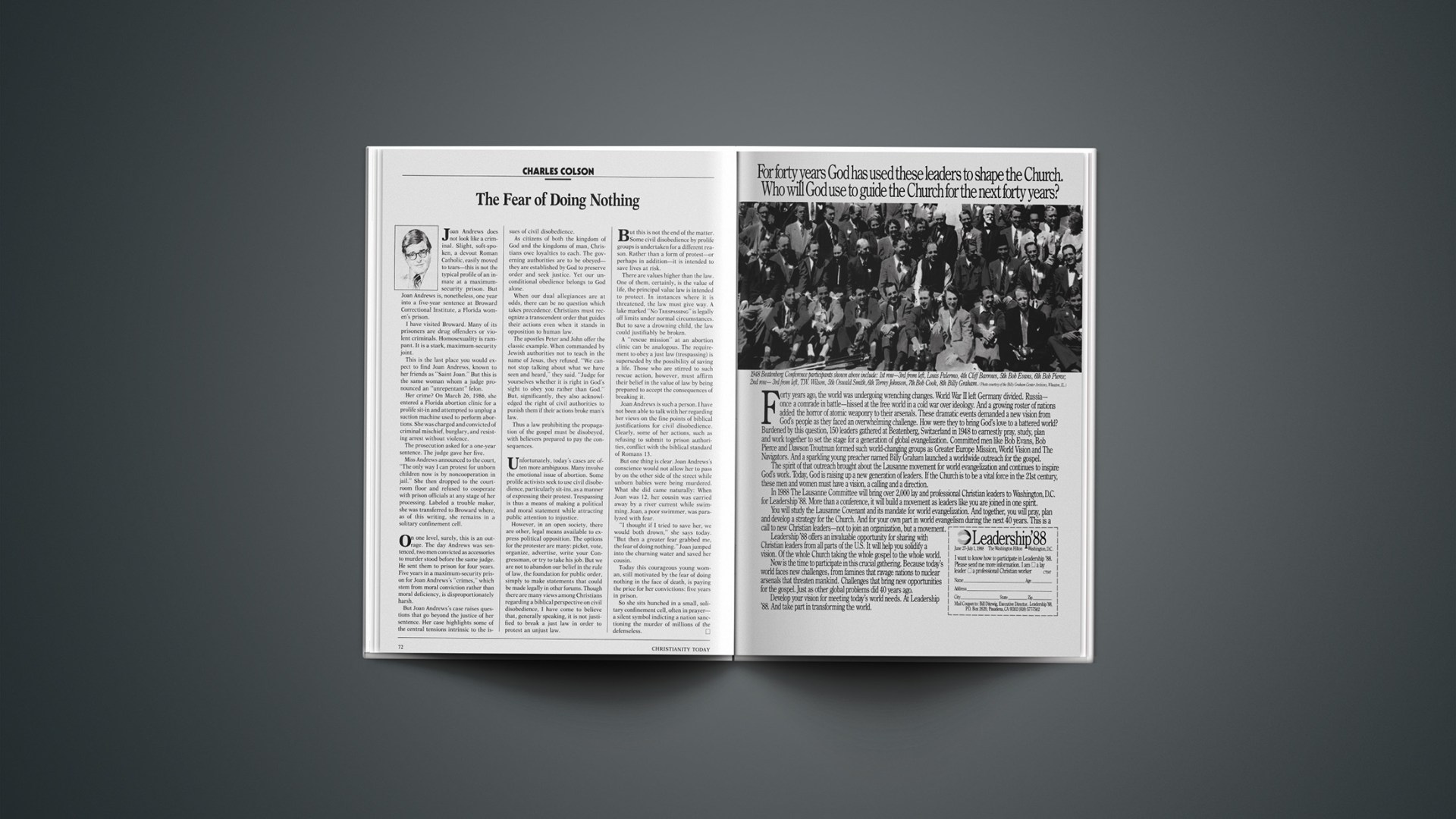Joan Andrews does not look like a criminal. Slight, soft-spoken, a devout Roman Catholic, easily moved to tears—this is not the typical profile of an inmate at a maximum-security prison. But Joan Andrews is, nonetheless, one year into a five-year sentence at Broward Correctional Institute, a Florida women’s prison.
I have visited Broward. Many of its prisoners are drug offenders or violent criminals. Homosexuality is rampant. It is a stark, maximum-security joint.
This is the last place you would expect to find Joan Andrews, known to her friends as “Saint Joan.” But this is the same woman whom a judge pronounced an “unrepentant” felon.
Her crime? On March 26, 1986, she entered a Florida abortion clinic for a prolife sit-in and attempted to unplug a suction machine used to perform abortions. She was charged and convicted of criminal mischief, burglary, and resisting arrest without violence.
The prosecution asked for a one-year sentence. The judge gave her five.
Miss Andrews announced to the court, “The only way I can protest for unborn children now is by noncooperation in jail.” She then dropped to the courtroom floor and refused to cooperate with prison officials at any stage of her processing. Labeled a trouble maker, she was transferred to Broward where, as of this writing, she remains in a solitary confinement cell.
On one level, surely, this is an outrage. The day Andrews was sentenced, two men convicted as accessories to murder stood before the same judge. He sent them to prison for four years. Five years in a maximum-security prison for Joan Andrews’s “crimes,” which stem from moral conviction rather than moral deficiency, is disproportionately harsh.
But Joan Andrews’s case raises questions that go beyond the justice of her sentence. Her case highlights some of the central tensions intrinsic to the issues of civil disobedience.
As citizens of both the kingdom of God and the kingdoms of man, Christians owe loyalties to each. The governing authorities are to be obeyed—they are established by God to preserve order and seek justice. Yet our unconditional obedience belongs to God alone.
When our dual allegiances are at odds, there can be no question which takes precedence. Christians must recognize a transcendent order that guides their actions even when it stands in opposition to human law.
The apostles Peter and John offer the classic example. When commanded by Jewish authorities not to teach in the name of Jesus, they refused. “We cannot stop talking about what we have seen and heard,” they said. “Judge for yourselves whether it is right in God’s sight to obey you rather than God.” But, significantly, they also acknowledged the right of civil authorities to punish them if their actions broke man’s law.
Thus a law prohibiting the propagation of the gospel must be disobeyed, with believers prepared to pay the consequences.
Unfortunately, today’s cases are often more ambiguous. Many involve the emotional issue of abortion. Some prolife activists seek to use civil disobedience, particularly sit-ins, as a manner of expressing their protest. Trespassing is thus a means of making a political and moral statement while attracting public attention to injustice.
However, in an open society, there are other, legal means available to express political opposition. The options for the protester are many: picket, vote, organize, advertise, write your Congressman, or try to take his job. But we are not to abandon our belief in the rule of law, the foundation for public order, simply to make statements that could be made legally in other forums. Though there are many views among Christians regarding a biblical perspective on civil disobedience, I have come to believe that, generally speaking, it is not justified to break a just law in order to protest an unjust law.
But this is not the end of the matter. Some civil disobedience by prolife groups is undertaken for a different reason. Rather than a form of protest—or perhaps in addition—it is intended to save lives at risk.
There are values higher than the law. One of them, certainly, is the value of life, the principal value law is intended to protect. In instances where it is threatened, the law must give way. A lake marked “NO TRESPASSING” is legally off limits under normal circumstances. But to save a drowning child, the law could justifiably be broken.
A “rescue mission” at an abortion clinic can be analogous. The requirement to obey a just law (trespassing) is superseded by the possibility of saving a life. Those who are stirred to such rescue action, however, must affirm their belief in the value of law by being prepared to accept the consequences of breaking it.
Joan Andrews is such a person. I have not been able to talk with her regarding her views on the fine points of biblical justifications for civil disobedience. Clearly, some of her actions, such as refusing to submit to prison authorities, conflict with the biblical standard of Romans 13.
But one thing is clear. Joan Andrews’s conscience would not allow her to pass by on the other side of the street while unborn babies were being murdered. What she did came naturally: When Joan was 12, her cousin was carried away by a river current while swimming. Joan, a poor swimmer, was paralyzed with fear.
“I thought if I tried to save her, we would both drown,” she says today. “But then a greater fear grabbed me, the fear of doing nothing.” Joan jumped into the churning water and saved her cousin.
Today this courageous young woman, still motivated by the fear of doing nothing in the face of death, is paying the price for her convictions: five years in prison.
So she sits hunched in a small, solitary confinement cell, often in prayer—a silent symbol indicting a nation sanctioning the murder of millions of the defenseless.










